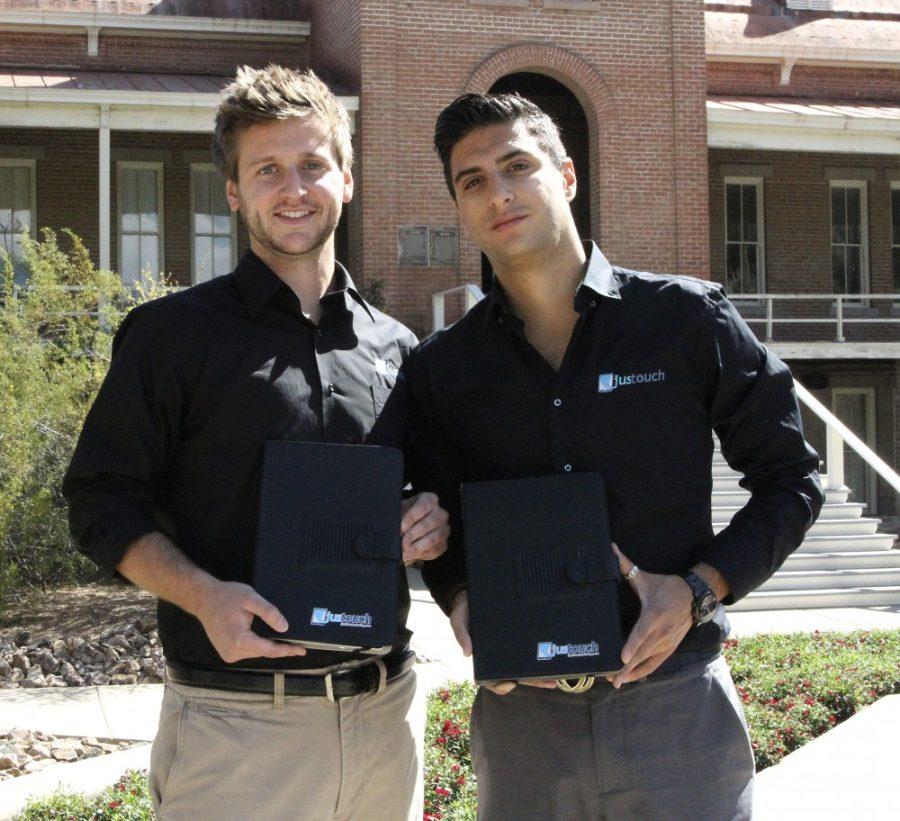A pair graduates from the Eller College of Management have developed a digital menu service that allows restaurant patrons to browse, order and pay for meals from their table using electronic tablets.
JusTouch, a company founded by May 2011 graduates Josh Banayan and Jarrod Carr, started out as a project for the entrepreneurship program during their senior year and quickly became a company of its own. After placing second in the college’s year-end showcase competition, Banayan and Carr quickly gave up their own post-graduation plans to instead pursue a future as entrepreneurs.
“Jarrod was supposed to go to law school, and I was supposed to get my third major and come back for another semester,” said Banayan, who was studying entrepreneurship and management information systems when he co-founded JusTouch. “Both of us decided to scratch that … we launched the company as soon as the program was done.”
The service itself implements its own devices and software into today’s restaurant setup to create a system that allows waiters and waitresses more time to focus on customer interactions and less time on the technical aspect of taking orders and payments, according to the JusTouch co-founders.
When customers go to a restaurant using the JusTouch service, the hostess seats the patrons and hands them a 10-inch or 7-inch tablet, depending on the location. A restaurant’s entire menu can be accessed from the device. Currently, the company’s two interfaces consist of food and wine. From the menu, users can filter their search by factors like price or type, and can see pictures of each selection, its nutritional information and make changes to the meal accordingly. Much like an Internet browser, tabs for each customer are also available, allowing patrons to divide their checks between themselves, then swipe their credit or debit card on the device. The tablets themselves are manufactured in China, specifically for JusTouch.
While the device may seem to replace a waiter or waitress, Banayan and Carr said that the system is meant to complement a wait staff, not supersede it.
“Our goal is to keep the restaurant process as close to what it is now as possible,” Banayan said.
Additionally, Carr said they predict that tips for waiters and waitresses will go up, based on the logic that the technology will allow them to focus more on the customer. The device also allows for a number of options on what percentage to tip, ranging from 10 percent to 20 percent. Citing a study done on New York taxi cabs that implement the same tipping options, Carr said that tipping increased by 22 percent. JusTouch tablets, he said, will likely have a similar effect.
There are currently two restaurants in Tucson that are using the JusTouch system. PY Steakhouse is offering its wine menu on the tablets, and a contract has been signed at Taco Bron in the Tucson International Airport, which should be operational within the week as a kiosk-style menu, with a tablet mounted to a wall. The company is also in the process of developing a marketing campaign to attract more restaurants to the service.
Kevin Brady, the manager of PY Steakhouse, said he was pleased with the service in a statement issued to JusTouch.
“Working with JusTouch and integrating their tablets into PY Steakhouse has played a major role in the success of our operations,” Brady said. “The tablet has made our waiters’ lives easier and gives our customers a great way to learn more about their favorite wines.”
Banayan and Carr attribute their company’s progress almost completely to their time in Eller, and said that they still keep in contact with many of their former professors. The McGuire Center for Entrepreneurship’s mentoring program was what helped them turn their school project into an actual business, Banayan said.
“It’s very difficult to teach entrepreneurship — you have it or you don’t,” he said. “But what our entrepreneurship program is amazing at doing is giving you that network. The reason why we’re still in Tucson is because of Eller.”
As for the future, the co-founders said they are interested in making JusTouch a nationwide company, and would like to expand it to other areas that use menus outside of the restaurant industry.
“This is going to be a national business,” Banayan said. “This is something that any restaurant can benefit from. There’s not much that’s going to be stopping us.”









